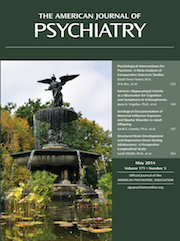Coaching in Healthy Dietary Practices in At-Risk Older Adults: A Case of Indicated Depression Prevention
Abstract
Prevention of major depressive disorder is important because current treatments are only partially adequate in reducing symptom burden and promoting health-related quality of life. Lifestyle interventions may be a desirable prevention strategy for reasons of patient preference, particularly among older patients from minority groups. Using evidence from a randomized depression prevention trial for older adults, the authors found that coaching in healthy dietary practices was potentially effective in protecting at-risk older adults from developing incident episodes of major depression. The authors describe the dietary coaching program (highlighted in a case example) as well as the feasibility and potential efficacy of the program within the context of evidence-based interventions for preventing episodes of major depression and mitigating symptoms of depression. Older adults receiving dietary coaching experienced a low incidence of major depressive episodes and exhibited a 40%−50% decrease in depressive symptoms, as well as enhanced well-being, during the initial 6-week intervention; these gains were sustained over 2 years. The authors also describe why lifestyle interventions like coaching in healthy dietary practices may hold promise as effective, practical, nonstigmatizing interventions for preventing episodes of major depressive disorder in older adults with subsyndromal depressive symptoms.



